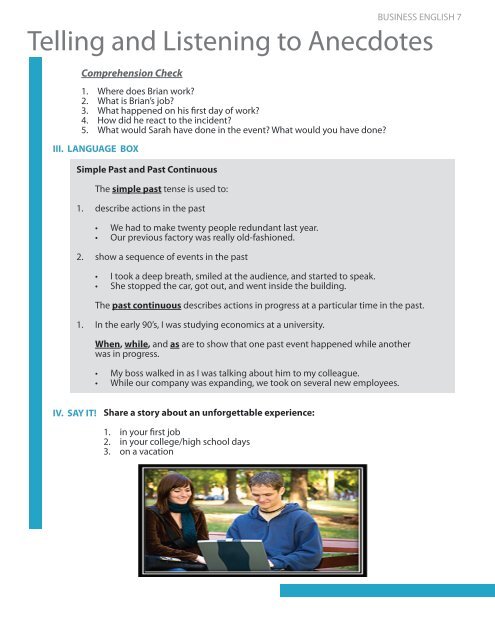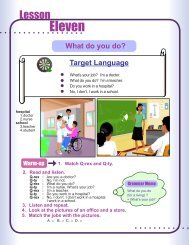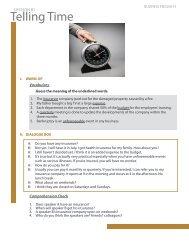Passing on Information Informally
Passing on Information Informally
Passing on Information Informally
Create successful ePaper yourself
Turn your PDF publications into a flip-book with our unique Google optimized e-Paper software.
Telling and Listening to Anecdotes<br />
III. LANGUAGE BOX<br />
IV. SAY IT!<br />
Comprehensi<strong>on</strong> Check<br />
1. Where does Brian work?<br />
2. What is Brian’s job?<br />
3. What happened <strong>on</strong> his first day of work?<br />
4. How did he react to the incident?<br />
5. What would Sarah have d<strong>on</strong>e in the event? What would you have d<strong>on</strong>e?<br />
Simple Past and Past C<strong>on</strong>tinuous<br />
The simple past tense is used to:<br />
1. describe acti<strong>on</strong>s in the past<br />
• We had to make twenty people redundant last year.<br />
• Our previous factory was really old-fashi<strong>on</strong>ed.<br />
2. show a sequence of events in the past<br />
• I took a deep breath, smiled at the audience, and started to speak.<br />
• She stopped the car, got out, and went inside the building.<br />
The past c<strong>on</strong>tinuous describes acti<strong>on</strong>s in progress at a particular time in the past.<br />
1. In the early 90’s, I was studying ec<strong>on</strong>omics at a university.<br />
When, while, and as are to show that <strong>on</strong>e past event happened while another<br />
was in progress.<br />
• My boss walked in as I was talking about him to my colleague.<br />
• While our company was expanding, we took <strong>on</strong> several new employees.<br />
Share a story about an unforgettable experience:<br />
1. in your first job<br />
2. in your college/high school days<br />
3. <strong>on</strong> a vacati<strong>on</strong><br />
BUSINESS ENGLISH 7






